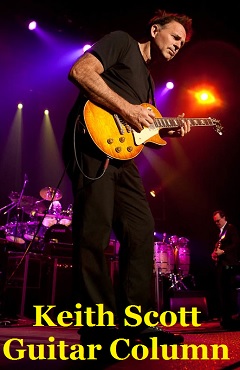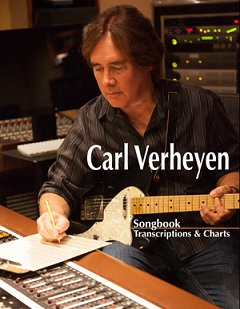Trevor Rabin
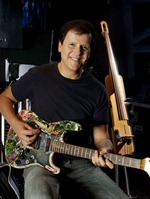
Trevor Rabin has just released his new album “Jacaranda”, 23 years since his last album “Can’t Look Away”. Trevor Rabin made his name in the music scene when he took part as a key figure on the YES album “90125” in the 80s. After parting with YES, Trevor went on to do film scores, and was involved in productions of numerous movies such as “Armageddon” and “National Treasure”. Trevor continues to work in the film industry, creating quality music for various movies. Here, Trevor talks about his new release, “Jacaranda”.
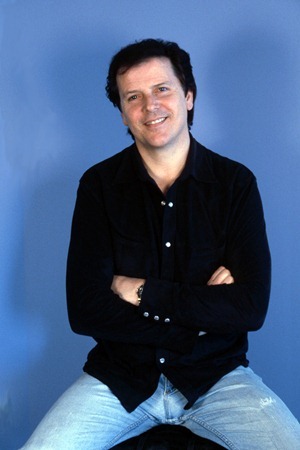
Interview / Text Mamoru Moriyama
Translation Louis Sesto (EAGLETAIL MUSIC)
Trevor Rabin has just released his new album “Jacaranda”, 23 years since his last album “Can’t Look Away”. Trevor Rabin made his name in the music scene when he took part as a key figure on the YES album “90125” in the 80s. After parting with YES, Trevor went on to do film scores, and was involved in productions of numerous movies such as “Armageddon” and “National Treasure”. Trevor continues to work in the film industry, creating quality music for various movies.
Trevor showed his talents as a singer on his previous album “Can’t Look Way”. But on this new album “Jacaranda”, Trevor presented to us an all-instrumental album.
Even after the release of his new album “Jacaranda”, Trevor keeps busy with various projects with the film music industry. Nevertheless, Trevor took time to answer some questions here with MUSE ON MUSE.
Muse On Muse : It’s been 23 years since your last solo album “Can’t Look Away” back in 1989. How do you feel now after completing your new solo album “Jacaranda”?
Trevor Rabin : It took this long because I really wanted to have something to say. I felt invigorated while doing it and feel this is the most inspired piece of work I’ve ever done.
MM : How and why did you decide to record “Jacaranda”? Please tell us about the concept of this album. Also, why did you decide to make this an instrumental album, despite the fact that you’re also a great singer?
TR : I felt strongly about working with orchestra and writing with orchestra, which I did very little of in Yes.
MM : You have been successful in the field of film music. How and why did you get into that field? Did it give you a different feeling, in contrary to what you’ve experienced with RABBITT, YES, and your solo career?
TR : Working in film is as close to writing classical music, and every film provides a new style.
MM : How long did it take you to record the new album?
TR : The recording process took over six years. This was primarily due to the time I would spend composing for a film – typically 2-3 months, 24 hours a day, seven days straight – and then come back to work on the album. So it was done sporadically, as inspiration struck, over a number of years. However, I spend most of last year dedicated to finishing it.
MM : You are known to be able to play various instruments. Did you play most of the instruments on this album as well? Who else played on this album? How and why were they chosen to play on the album?
TR : Noted drummer Vinnie Colaiuta, Lou Molino, and my son Ryan Rabin (Grouplove) played drums on various tracks. I also had bass guitarist Tal Wilkenfeld (Jeff Beck, Herbie Hancock) who plays on the track “Anerley Road.” Liz Constantine sang vocals on the track “Rescue”.
MM : My first impression on the album was not only the great perfection of music but the fact that your amazing guitar performance and technique were still alive and kicking. Knowing that you must have been busy working on film music and probably having less time to play (as you did during the YES years), how do you keep up your chops and techniques? Did you have some kind of warm up period before recording this album?
TR : I take it very seriously that I have to keep up my technique and would spend many hours playing both in between films – and during films.
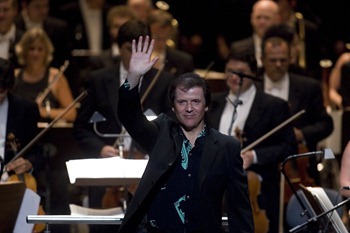
MM : On the opening track “Spider Boogie”, the slide guitar on the acoustic and the freely bouncing rhythm guitar were impressive. It almost sounded as though there were two different guitar players playing on the same track. Was this just you doing an overdub?
TR:Yes.
MM : “Market Street” has an interesting approach with the rhythms of the various instruments, also creating an addictive vibe that makes you want to listen to the song over and over. What are your thoughts when it comes to the rhythmical approaches to a song?
TR : I very much enjoy working in different meters, to the point of working two, sometimes three differenttime signatures.
MM : We were able to listen to the intro of “Annerly Road” on your website. Was this a song idea you had from quite a while ago?
TR : That song started years ago I’m happy to say made it all the way through to the album.
MM : “Through The Tunnel” has a soft piano and acoustic guitar part, then has a strong rhythm with distorted guitars. I find this contrast very interesting. What are your views on thissong?
TR : The interesting thing about this song is it’s written as kind of a shuffle. …yet the time signature is in 20/8. I think that makes for some of the interesting dynamics the song goes through.
MM : Listening to “The Branch Office”, as well as the rest of the songs on the album, there seems to be a key phrase on the guitar that makes up the core of each song. These key phrasessound veryintricate and difficult, and not something that you can just play when you’re improvising. In that sense, this album seems to have a very high level of technical performance. How do you personally feel?
TR : I continually work on improving my technique, my craft. Looking at what I’ve just accomplished with this album I’m very satisfied. If I return in a few months though I’m sure I’ll hear it differently and want to change things.
MM : “Rescue” sounds very beautiful and sublime, with a sternness on the guitar chords, and a mystical feeling by the female vocals. What is your perspective on this song?
TR : I always enjoyed the melody, and thought it sounded right in the place I put it.
MM : “Killarney 1 & 2” has a beautiful piano part to it. Did you play this piano part? Do you use the piano or the guitar more often when writing songs? I recall listening to “90124” that included a demo track where you were humming to an acoustic guitar.
TR:Yes, I play all the piano on the album …I write on both instruments.
MM : “Me And My Boy” starts out with a guitar riff with a great hard rock feel, and has a great impact. What do you think?
TR : That’s a song I played with my son Ryan which I loved doing.
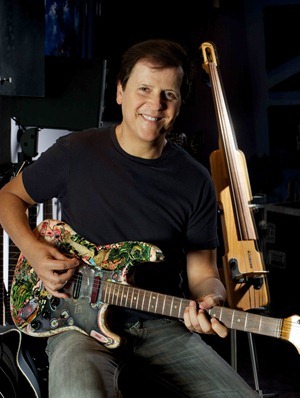
MM : Songs such as “Freethought” and “Zoo Lake” are very melodic with a pleasant fusion vibe. Although, it doesn’t have the long solo parts that fusion songs usually have, thus making it nice andcompact, and easy to listen to. Was this done in consideration for not only the instrumental listeners but for more mainstream listeners as well?
TR : I just let things go naturally.
MM : Where do you get your imagination when you write songs? Obviously, being able to write songs doesn’t come from just learning music theory. I’m sure there it has to do a lot with life experiences as well. What is your perspective regarding song writing?
TR : That’s a good question. I never know when it’s going to hit. I never know where it’s coming from. The only thing I can do is go into the studio and decide I’m going in there to write and to create. If something hits me I’m in luck and if it doesn’t I come back another time.
MM : Please tell us about your gear. What guitars, amps, effectors did you use for this recording? What kind of guitar picks did you use? What kind of guitar strings did you use ?
TR : I use various different amplifiers including an Ampeg VT120, an old Marshall 100, and a Fernandez. My effect units include a Korg A3 as well as a rack with anumber of different pieces of gear in it built by Bob Bradshaw. The rack contains an MXR compressor, a Roland fuzz box, an MXR delay 1500, a TC6000 reverb unit and various other software based compressors and delays. As far as recording my dobro I record that with my Neuman 87 just a foot away from the guitar. I use D’Adario strings.
MM : When you recorded “Can’t Look Away”, you used the KORG A1 Multi Effector, which was new at the time, for making your guitar sound without using a guitar amp. Nowadays, amp simulators and software have become common, but it seems as though you were a pioneer of the moderndigital sound technology. Do you still experiment a lot in making your sound? What do you think of modern music in which a lot of the guitar sounds are made with digital technology?
TR : I think if you’re careful you can still retain a certain amount of organic soundness to the sound using digital plug ins however I still do lean a lot using the traditional way ofpushing the sound through normal amplification.
MM : What are your future plans? Do you have plans for touring with this album? A lot of the songs on the album are made with multiple guitar sounds, and may be hard to reproduce on stage, but I definitely would like to see these songs played live.
TR : The album was done out of sheer joy and love and never restricted myself to doing anything beyond this album. That’s where I am now.
MM : Please give a message to your Japanese fans that have been waiting a long time to listen to your newsolo album.
TR : I know that I am not alone being heartbroken at the terrible disasters that have unfolded in Japan. In my music I’m hoping to connect with all the people in the world who have been through suffering and are feeling alone. The re-working of the song “Rescue” had the Japan devastation in my thoughts. “Rescue” speaks to the confusion we face in life and the question of why we are here. The introduction is a yearning which transitions into a desire for help in the body of the song. Peace and hope close the song which I would like to share with the people of Japan.
Trevor Rabin official site : http://trevorrabin.net/
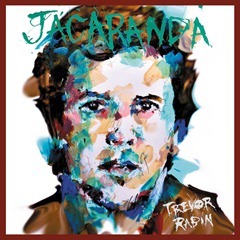
Jacaranda / Trevor Rabin
1 Spider Boogie
2 Market Street
3 Anerley Road
4 Through The Tunnel
5 The Branch Office
6 Rescue
7 Killarney 1 & 2
8 Storks Bill Geranium Waltz
9 Me And My Boy
10 Freethought
11 Zoo Lake
12 Gazania
